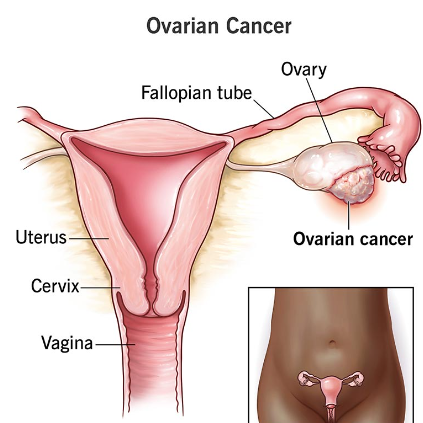Ovarian cancer is one of the most serious cancers affecting women. It occurs when abnormal cells in an ovary begin to multiply out of control and form a tumor. If left untreated, the tumor can spread to other parts of the body. Here, we break down everything you need to know about ovarian cancer, including its symptoms, causes, how it is diagnosed, and treatment options.
Symptoms of Ovarian Cancer
Ovarian cancer symptoms are notoriously vague, which often leads to delays in diagnosis.
Common symptoms include:
- Bloating or swelling of the abdomen
- Pelvic or abdominal pain
- Difficulty eating or feeling full quickly
- Urinary symptoms such as urgency or frequency
- These symptoms are also commonly associated with many benign conditions, which is why ovarian cancer is often not diagnosed until it has advanced.
Causes of Ovarian Cancer
The exact cause of ovarian cancer is unknown, but several risk factors have been identified:
- Age: Most cases occur in women over the age of 50.
- Family History: Having a family history of ovarian cancer, breast cancer, or colorectal cancer can increase your risk.
- Being overweight or obese: Having excess weight or being obese heightens the likelihood of developing ovarian cancer.
- Reproductive History: Women who have never been pregnant or had their first child after 30 may have a higher risk.
Diagnosis of Ovarian Cancer
Diagnosing ovarian cancer typically involves several steps:
Pelvic Examination: Checking for masses or fluid in the abdominal cavity.
Imaging Tests: Ultrasound or CT scans can help visualize the ovaries in more detail.
Blood Tests: Tests, such as the CA-125, can detect a protein that’s often elevated in women with ovarian cancer.
Biopsy: The definitive diagnosis is made by examining tissue, usually obtained during surgery.

Treatment of Ovarian Cancer
Treatment for ovarian cancer depends on the stage of the disease, the patient’s overall health, and their treatment preferences:
Surgery: The main treatment for ovarian cancer is surgery to remove the tumor.
Chemotherapy: Often used after surgery to kill any remaining cancer cells.
Targeted Therapy: Uses drugs or other substances to precisely identify and attack cancer cells, usually while doing little damage to normal cells.
Radiation Therapy: Occasionally used for ovarian cancer, especially if it has spread.
Frequently Asked Questions
1. Can ovarian cancer be prevented?
While there’s no guaranteed way to prevent ovarian cancer, factors that may help reduce your risk include using oral contraceptives, having children, and breastfeeding etc.
2. How often should I get screened for ovarian cancer?
Regular screenings aren’t recommended for asymptomatic women who do not have a high risk of developing this cancer. However, women with high-risk factors such as genetic mutations might benefit from more frequent screenings.
3. Does ovarian cancer have a high survival rate?
The survival rate depends greatly on the stage of cancer at diagnosis. Early-stage ovarian cancer has a much better prognosis than advanced-stage cancer. However, because symptoms are often vague, many cases are diagnosed at a later stage.
Ovarian cancer, while challenging, can be managed and treated, especially when caught early. Awareness of the symptoms and regular medical check-ups can help in early detection and increase the chances of successful treatment.

